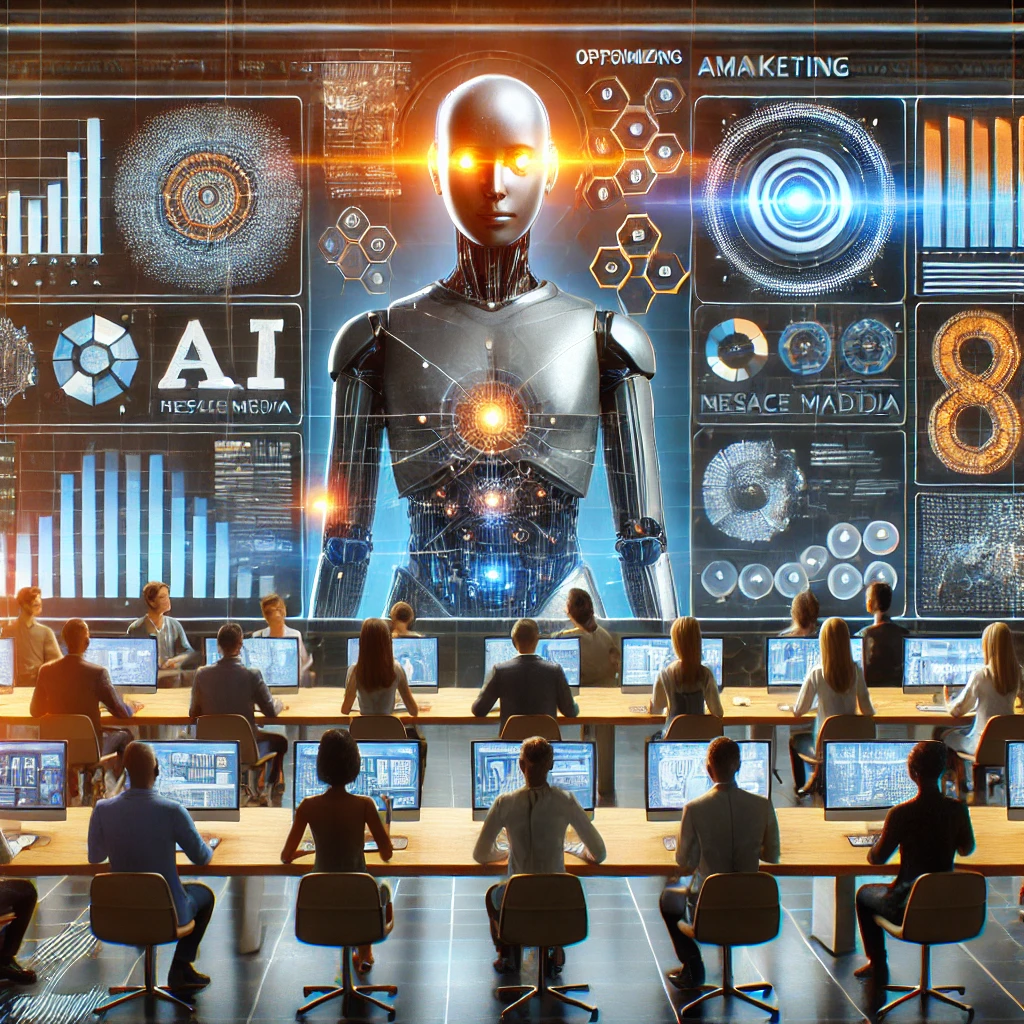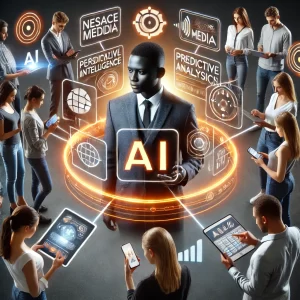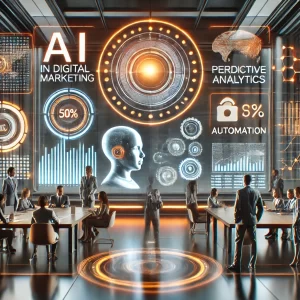The impact of AI on digital marketing is transforming how businesses connect with consumers, driving unprecedented changes across strategies and operations. Imagine a world where every marketing message is tailored specifically to each individual’s preferences, behaviors, and needs; this is no longer a distant fantasy but a current reality made possible by cutting-edge AI technologies.
As marketers increasingly turn to artificial intelligence to analyze vast amounts of data, automate processes, and enhance customer interactions, the opportunities for creating personalized and effective campaigns are limitless. In this blog post, we’ll explore the profound effects of AI on digital marketing, uncovering the tools and strategies that are reshaping the industry and discussing the future trends to watch. Get ready to dive into the evolving landscape where artificial intelligence meets marketing innovation!
Understanding AI in Digital Marketing
Artificial Intelligence (AI) has transformed the landscape of various industries, with digital marketing being one of the most affected. As businesses strive to adapt to evolving consumer behaviors, the impact of AI on digital marketing becomes increasingly evident. AI technologies enable companies to analyze large volumes of data, make informed decisions, and create more personalized marketing strategies.
Definition of Artificial Intelligence
At its core, artificial intelligence refers to the simulation of human intelligence in machines. This technology enables systems to learn from data, recognize patterns, and make decisions with minimal human intervention. In the context of digital marketing, AI range from simple algorithms that optimize ad placements to complex machine learning models that predict consumer behaviors.
Overview of Digital Marketing
Digital marketing encompasses a variety of strategies aimed at reaching potential customers through online platforms. Key components include:
- Search Engine Optimization (SEO): Improving website visibility on search engines.
- Social Media Marketing: Engaging consumers through platforms like Facebook and Instagram.
- Content Marketing: Creating valuable content to attract and retain customers.
- Email Marketing: Targeting consumers directly via personalized emails.
The convergence of AI and these strategies has paved the way for innovative marketing techniques that enhance efficiency and effectiveness.
Explore how a digital marketing agency can unlock success for your business
The Current Landscape of Digital Marketing
As the digital marketplace evolves, businesses face numerous challenges. Understanding the current landscape is essential for leveraging the impact of AI on digital marketing effectively.
Key Trends Shaping Digital Marketing
- Increased Focus on Personalization: Today’s consumers expect tailored experiences, making personalization a vital aspect of marketing strategies.
- Mobile Optimization: With more users accessing the internet via mobile devices, optimizing content for mobile platforms is crucial.
- Video Content Dominance: Engaging consumers through video has become more prevalent, with platforms favoring video content in algorithms.
Discover the latest social media marketing trends for 2025
Challenges Faced by Marketers
Despite advancements, marketers encounter challenges such as:
- Data privacy regulations (e.g., GDPR)
- Keeping up with rapidly changing technologies
- Measuring ROI on marketing efforts
By understanding these trends and challenges, businesses can harness the impact of AI on digital marketing to create targeted and effective marketing campaigns.
For more information on digital marketing trends, you can explore HubSpot.
The Impact of AI on Digital Marketing
The impact of AI on digital marketing is profound, enabling businesses to achieve greater levels of precision and efficiency in their marketing efforts. By leveraging AI technologies, companies can better understand consumer behavior, streamline their operations, and personalize their interactions.
Enhancing Data Analysis and Insights
One of the most significant contributions of AI in digital marketing is its ability to analyze large datasets quickly and accurately. Here are some ways AI enhances data analysis:
- Predictive Analytics: AI algorithms can analyze past consumer behavior to forecast future trends, allowing marketers to make data-driven decisions.
- Real-time Insights: Businesses can gain immediate feedback on ad performance, customer preferences, and market trends, enabling agile marketing strategies.
- Consumer Segmentation: AI can categorize audiences into different segments based on demographics, preferences, and behaviors, resulting in more targeted campaigns.
Master marketing analytics for business growth
Personalization at Scale
Personalization has become a crucial factor in digital marketing, and AI plays a vital role in scaling these efforts. Here’s how:
- Dynamic Content Creation: AI tools can generate content tailored to individual users based on their previous interactions and preferences.
- Recommendation Engines: E-commerce platforms use AI to recommend products, enhancing the shopping experience and driving sales.
- Behavioral Targeting: Marketers can target individuals with ads that resonate specifically with their needs, significantly improving engagement rates.
Automation of Marketing Tasks
AI-driven automation reduces the burden of repetitive marketing tasks and allows teams to focus on strategy and creativity. Key areas of automation include:
- Email Marketing: Automated email campaigns that adapt based on user behavior enhance customer engagement without manual intervention.
- Social Media Management: AI tools can schedule posts, analyze engagement metrics, and even respond to customer queries, maintaining an active online presence.
- Ad Optimization: AI can automatically adjust bidding strategies in real-time, maximizing ad spend and improving overall campaign performance.
By recognizing and harnessing the impact of AI on digital marketing, businesses can position themselves to engage consumers more effectively and drive growth.
AI-Driven Tools and Technologies
The impact of AI on digital marketing is largely driven by advanced tools and technologies that enhance efficiency and effectiveness. These innovations are changing how marketers approach their strategies, leading to smarter engagement with their audience.
Chatbots and Customer Engagement
Chatbots are one of the most recognized applications of AI in digital marketing. They provide immediate support and information to customers, improving the overall user experience. Key benefits of chatbots include:
- 24/7 Availability: Chatbots can address customer inquiries at any hour, increasing engagement opportunities.
- Instant Responses: They reduce wait times by providing quick answers to frequently asked questions.
- Personalized Interactions: Chatbots can gather user data to deliver tailored recommendations and promotions.
Predictive Analytics and Consumer Behavior
Predictive analytics powered by AI is revolutionizing how businesses understand consumer behavior. This technology helps marketers anticipate future buying patterns and optimize their strategies accordingly. Its key features include:
- Forecasting Sales Trends: By analyzing historical data, businesses can predict sales spikes and adjust inventory levels.
- Identifying Customer Churn: AI can highlight at-risk customers, allowing businesses to implement retention strategies proactively.
- Enhancing Marketing Campaigns: Marketers can tailor their campaigns based on predicted behaviors, effectively targeting the right audience at the right time.
AI in Content Creation and Curation
AI is not only used for analysis but also plays a vital role in content creation and curation. Here’s how AI facilitates this process:
- Automated Content Generation: Tools like natural language processing (NLP) can create written content, eliminating the time required for manual efforts.
- Content Curation: AI algorithms can recommend relevant articles and blogs based on user interests, keeping audiences engaged with fresh, pertinent material.
- SEO Optimization: AI tools assist in keyword research, helping marketers craft content that ranks better on search engines.
The impact of AI on digital marketing is multifaceted, enabling marketers to operate more efficiently and effectively while driving genuine engagement with customers. Utilizing these AI-driven tools and technologies not only enhances marketing outcomes but also creates a more customized experience for consumers.
Learn why your business needs a strong online presence
Benefits of Integrating AI in Digital Marketing
The impact of AI on digital marketing brings several substantial benefits that can significantly transform a brand’s approach to engaging with consumers. From increased efficiency to improved targeting, integrating AI into marketing strategies can lead to better overall business outcomes.
Improved Efficiency and Cost Reduction
One of the primary advantages of adopting AI in digital marketing is the increase in operational efficiency. This translates to cost savings and better resource allocation. Here are some key points to consider:
- Automated Processes: Many repetitive tasks, such as data entry, email marketing, and social media scheduling, can be automated, allowing marketing teams to focus on strategic initiatives.
- Streamlined Workflows: AI tools can help optimize workflows, reducing the time spent on project management and enhancing team collaboration.
- Lower Operational Costs: By automating various functions, businesses can decrease labor costs while maintaining productivity levels.
Better Targeting and Customer Segmentation
With AI, marketers gain access to powerful analytics and segmentation capabilities that enable precise targeting of their audience. This enhanced targeting results in:
- Data-Driven Insights: AI analyzes vast amounts of consumer data to identify specific segments based on behavior, preferences, and demographics.
- Personalized Marketing Campaigns: Tailoring messages for different audience segments increases the likelihood of engagement and conversion.
- Effective Resource Allocation: Marketers can allocate their budgets more effectively, targeting high-value customers and improving ROI.
Enhanced Customer Experience
At the heart of any successful marketing strategy is a great customer experience. The impact of AI on digital marketing contributes significantly to enhancing this experience:
- Real-Time Interaction: AI-powered chatbots provide immediate assistance, addressing customer inquiries and guiding them through their purchasing journey.
- Content Personalization: Leveraging AI allows marketers to tailor content suggestions to individual users, creating a more engaging and relevant experience.
- Proactive Customer Service: AI can predict customer issues before they arise, enabling businesses to implement solutions seamlessly and improve satisfaction.
By recognizing the numerous benefits of integrating AI in digital marketing, businesses can foster deeper connections with their audience while driving growth and profitability.
Ethical Considerations and Challenges
While the impact of AI on digital marketing offers numerous advantages, it also raises important ethical considerations and challenges that businesses must navigate. As companies increasingly rely on AI technologies, they must address these concerns to maintain consumer trust and comply with regulations.
Data Privacy Concerns
With the enhanced use of AI comes the responsibility to handle consumer data ethically. Businesses must be vigilant about:
- Consent: Ensuring that consumers understand how their data will be used and obtaining explicit consent for its collection and processing.
- Transparency: Being open about data practices fosters trust with consumers, informing them about data usage and the algorithms driving marketing decisions.
- Security: Robust measures should be in place to protect consumer data from breaches and unauthorized access, minimizing the risk of sensitive information falling into the wrong hands.
Balancing Automation with the Human Touch
While automation can enhance marketing efficiency, it can also lead to a disconnect if not managed thoughtfully. Key points to consider include:
- Personal Interaction: Maintaining personal interactions, especially in customer service, is vital. Businesses should find a balance between chatbot assistance and human support to ensure genuine engagement.
- Emotional Intelligence: AI lacks the emotional understanding that humans bring to interactions. Incorporating human oversight in automated processes can help preserve essential emotional connections.
- Brand Authenticity: Consumers value authenticity. Over-reliance on automation may undermine a brand’s genuine voice. Businesses should strive to integrate AI in ways that enhance rather than dilute their unique identity.
By acknowledging and addressing these ethical considerations and challenges, businesses can mitigate risks associated with the impact of AI on digital marketing. This will foster a more responsible approach to utilizing AI technologies.
Future Trends: What Lies Ahead for AI in Digital Marketing
As businesses continue to leverage the impact of AI on digital marketing, several future trends are emerging that promise to shape the industry in transformative ways. Understanding these trends can help marketers stay ahead of the curve and adopt innovative strategies.
Evolving Technologies and Innovations
The landscape of AI technology is ever-changing, and staying abreast of these developments is crucial for marketers. Key areas to watch include:
- Natural Language Processing (NLP): As NLP advancements improve, AI tools will become more proficient at understanding and generating human language, enabling more nuanced content creation and customer interactions.
- Voice Search Optimization: With the rise of smart speakers and voice-activated assistants, marketers will need to optimize content for voice search, necessitating a shift in keyword strategies.
- Augmented Reality (AR) and AI Integration: Combining AR with AI will enhance customer experiences, particularly in sectors like retail, where consumers can visualize products in their environment before purchasing.
Check out top digital marketing trends for 2024
Predictions for the Next Five Years
Anticipating the evolution of AI in digital marketing can guide businesses in their strategy development. In the next five years, consider these predictions:
- Increased Personalization: AI will enable hyper-personalized campaigns, allowing for real-time adjustments based on individual user behaviors and preferences.
- Greater Use of Predictive Analytics: Businesses will increasingly rely on AI-driven predictive analytics to inform decisions and anticipate customer needs, refining their marketing strategies accordingly.
- Focus on Customer Experience: AI will continue to play a pivotal role in enhancing customer experiences, driving companies to prioritize seamless interactions across all touchpoints.
Adopting these trends will allow businesses to maximize the impact of AI on digital marketing, fostering deeper connections with their audience and ensuring sustained growth in a competitive market.
Conclusion: Embracing AI for Future Success in Digital Marketing
The impact of AI on digital marketing is undeniably transformative, providing businesses with the tools to enhance efficiency, personalize interactions, and optimize strategies. As technology continues to evolve, it’s essential for marketers to embrace these changes to remain competitive in an ever-changing landscape.
Recap of AI’s Impact
AI is reshaping marketing in several critical ways:
- Efficiency Gains: From automating repetitive tasks to streamlining workflows, AI allows marketing teams to operate more effectively.
- Enhanced Targeting: AI’s data analysis capabilities enable marketers to segment audiences and tailor content to specific consumer needs.
- Improved Customer Experience: Through automation and personalization, AI enhances customer interactions and satisfaction.
Call to Action: Adopting AI Strategies
To harness the full potential of AI in digital marketing, businesses should consider the following steps:
- Invest in AI Tools: Explore AI-driven platforms that offer analytics, automation, and personalization features tailored to your marketing needs.
- Prioritize Data Privacy: Commit to ethical data collection and transparent practices to build consumer trust and comply with regulations.
- Stay Informed: Continuously educate your team about emerging trends and technologies within AI to adapt and revise strategies accordingly.
By embracing the impact of AI on digital marketing, businesses can create innovative campaigns, foster deeper customer relationships, and secure long-term success in their marketing efforts.
For further resources on AI in marketing, visit Forrester.
The Future of AI in Digital Marketing
The future landscape of digital marketing will be heavily influenced by the sustained impact of AI. As technology advances, businesses can leverage AI’s potential to create more effective marketing strategies and improve customer engagement.
Emerging Technologies to Watch
Several emerging technologies are set to further enhance the role of AI in digital marketing. Key innovations include:
- AI-Powered Personalization Engines: These systems will allow brands to create hyper-personalized experiences based on user behavior, preferences, and buying patterns.
- Advanced Analytics Solutions: Enhanced analytics platforms will utilize machine learning to provide deeper insights into customer data, enabling better decision-making.
- Voice and Visual Search Optimization: As more consumers turn to voice-activated devices and visual search capabilities, marketers will need to adapt their strategies to remain relevant.
AI and the Evolving Consumer Landscape
As consumer behavior shifts, the impact of AI on digital marketing will play a critical role in addressing new challenges:
- Expectations for Instant Gratification: With nearly instantaneous access to information, consumers expect quick responses and tailored solutions. AI can automate these processes, providing immediate and relevant customer service.
- Demand for Ethical AI Use: As businesses become more reliant on AI, consumer expectations for transparency and ethical usage will rise, compelling brands to prioritize responsible practices.
Preparing for the Future
To stay ahead in the competitive digital marketing landscape driven by AI, organizations should:
- Invest in Continuous Learning: Encourage teams to stay updated with the latest AI trends through training, workshops, and conferences.
- Foster Cross-Disciplinary Collaboration: Synergize efforts across marketing, data science, and AI departments to ensure a holistic approach to strategy development.
- Experiment with New Tools: Embrace innovative AI tools to explore their capabilities and assess their effectiveness within marketing initiatives.
By preparing for the future of AI in digital marketing, businesses can capitalize on its potential, improving engagement and driving growth in a competitive marketplace.
For further insights into AI-driven marketing strategies, visit McKinsey & Company.
What is the impact of AI on digital marketing?
The impact of AI on digital marketing refers to the significant ways in which artificial intelligence technologies are transforming marketing strategies, enabling businesses to analyze data, automate tasks, and personalize customer experiences more effectively than ever before.
How does AI enhance customer personalization in marketing?
AI enhances customer personalization in marketing by analyzing individual consumer data to tailor content, recommendations, and advertisements according to personal preferences and behaviors. This allows businesses to create targeted marketing campaigns that resonate more deeply with their audience.
What are some common AI tools used in digital marketing?
Common AI tools used in digital marketing include chatbots for customer service, predictive analytics platforms for forecasting consumer behavior, content creation tools that utilize natural language processing, and personalization engines that deliver customized experiences to users on various channels.
Are there ethical concerns associated with using AI in marketing?
Yes, there are ethical concerns associated with using AI in marketing, such as data privacy, transparency regarding data usage, and the risk of biased algorithms. Businesses must ensure they are handling consumer data responsibly and maintaining trust while leveraging AI technologies.
What future trends should marketers be aware of regarding AI?
Marketers should be aware of future trends such as the continued rise of hyper-personalization, the integration of AI with emerging technologies like augmented reality, and the growing need for ethical guideline adherence as consumers become more conscious of how their data is used in AI-driven marketing strategies.




